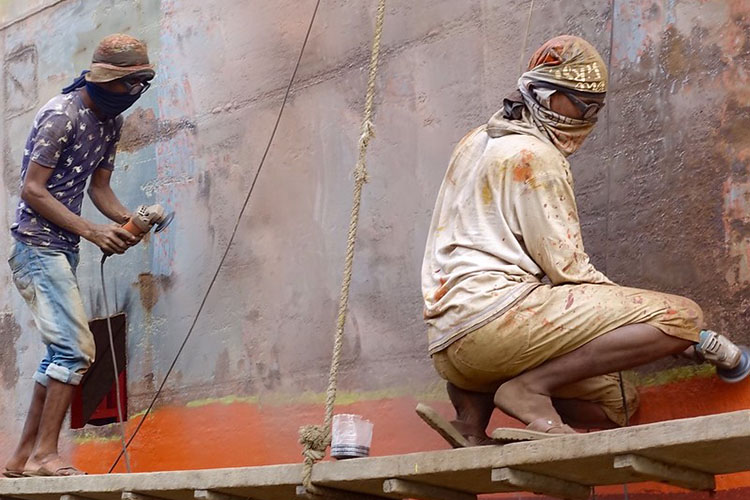By A.R. Chowdhury Repon, Secretary-General of Bangladesh Free Trade Union Congress (BFTUC)
Since the approval of the 2030 Agenda for Sustainable Development by all UN member states in 2015, the government of Bangladesh has integrated the Agenda and its 17 Sustainable Development Goals (SDGs) in the 7th (2016-2020) and 8th (2020-2025) Five-Year National Development Plan. All along, the Bangladeshi trade unions have been closely following the implementation process of these plans and how they have impacted workers and their communities.
This monitoring materialised in May 2020, when the ITUC-Bangladesh Council (ITUC-BC) released its first trade union report on SDG implementation. By exposing the shortcomings of national planning and implementation to attain the SDGs, the report completed the official narrative that the government presented at different fora, such as the Voluntary National Review presented at the UN High-level Political Forum in 2020.
Furthermore, this work showcased the strong commitment of Bangladeshi trade unions to the successful implementation of the 2030 Agenda. It also contributed to raising ITUC-BC’s development profile, enabling the organisation to start engaging with the UN Resident Coordinator (UNRC) in the country, Ms Mia Seppo. As a result, the ITUC BC’s request to the UNRC to introduce periodic consultations between trade unions and the UN Resident Coordinator’s Office (UNRCO) on issues related to the implementation of the SDGs in the country was welcomed by Ms Seppo and it led to the organisation of a first meeting in June 2020. During the meeting, the UN presented its response to the Covid pandemic and opened a discussion on how unions could contribute to it. This was the occasion for ITUC BC to present the development-related work of unions and bring forward our positions regarding a New Social Contract] for the sustainable development of Bangladesh.
Following that first meeting, a second consultation was organised in April 2021. This time it gathered both the ITUC BC and the National Coordination Committee for Workers’ Education (NCCWE), along with the UNRCO and other UN agencies operating in Bangladesh. The discussion of that meeting centred on the new UN Sustainable Development Cooperation Framework (DCF) that will start in 2022 and how unions could engage in it. The UN presented its draft intentions for the Common Country Analysis (CCA) and the DCF as well as the intended time-frame. This was a good occasion for those UN agencies that are not used to working with trade unions to discover unions’ contributions to the 2030 Agenda, beyond SDG 8.
In this regard, the ITUC’s Timefor8 campaign has provided a political steppingstone to strengthen the development profile of unions and connect with key stakeholders. It has also given unions the necessary technical skills to engage efficiently with the UN. The ILO country office in Bangladesh has also been very important for the process of engaging with the UNRC and has facilitated the organisation of both meetings.
Alongside the work done with the UN, the ITUC-BC also engaged with the national government on the matter of development. It issued a letter to the prime minister of Bangladesh in April 2021 calling on the government to make a new social contract a reality and to bring to the forefront of the 2021 HLPF Ministerial Declaration such demands as creating sustainable jobs, scaling up social protection systems, and supporting a global social protection fund. This work is ongoing and aims at promoting effective social dialogue as the best approach to rebuild sustainably. This objective is a central part of the Bangladeshi trade unions’ engagement in the SDGs. In light of this, unions have dutifully attended the tripartite conferences and industry consultations and they have submitted proposals to the government and employers’ associations on how to alleviate the plight of workers framed within the ITUC’s workers’ demands for a New Social Contract.
Finally, this process is also yielding results regarding our efforts to unify and strengthen the Bangladeshi labour movement around the 2030 Agenda. In August 2021, ITUC-BC and NCCWE agreed to work together on a common project that will aim at developing a common understanding and position of the SDGs and Bangladesh’s sustainable development.
The ITUC BC has embarked on a long-term journey to craft a better future for the workers of Bangladesh. On the way, we are making new allies within the labour movement and among governmental actors, employers and the UN. Our agenda is filling up with challenging but exciting opportunities: we are expecting to engage in consultations on the CCA and DCF, we are hoping to start direct conversations with the government’s SDG focal points, and we are looking forward to our strengthened collaboration with our brothers and sisters in the NCCWE.
Despite the many challenges that we are facing, we see many opportunities on the horizon!
Photo: Ship repair yards, Dhaka - Gerry Popplestone via FlickR


